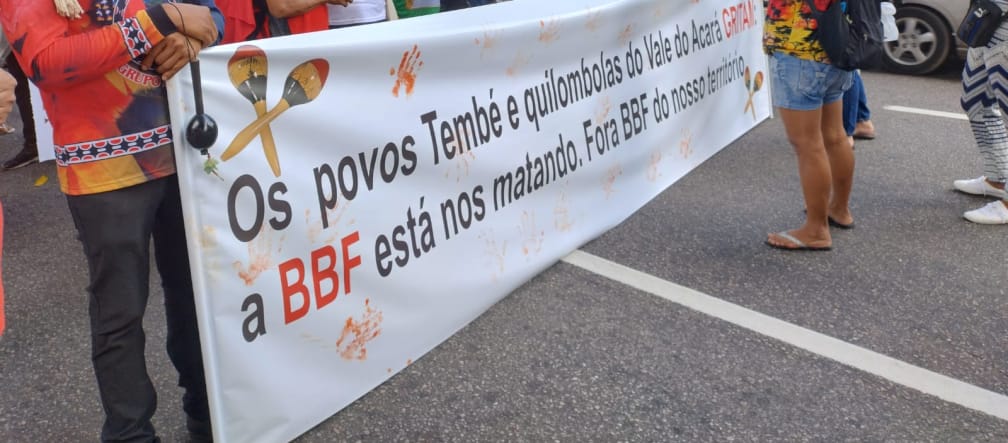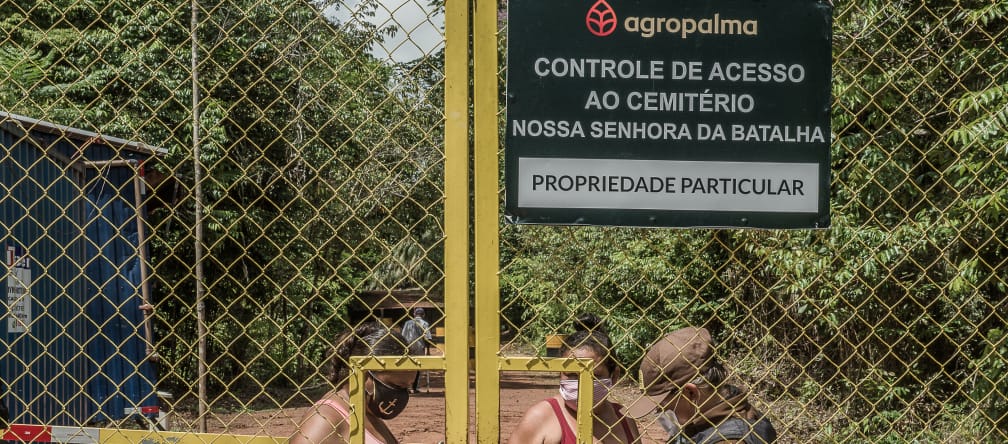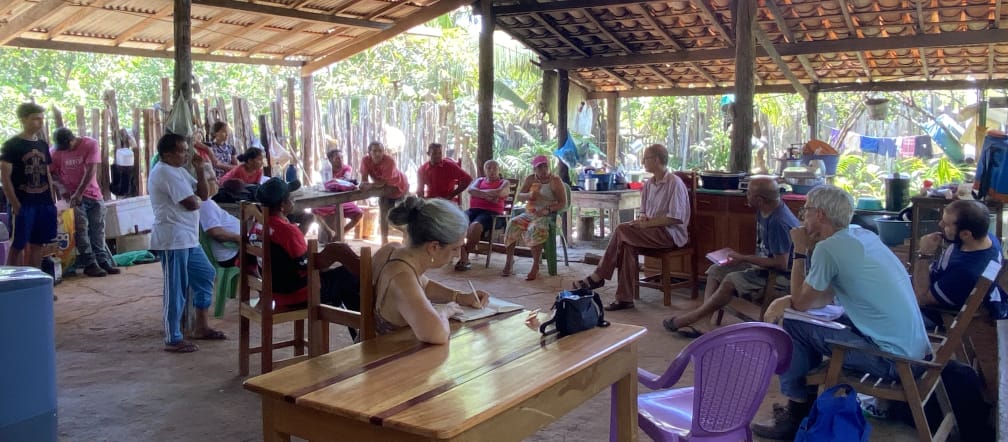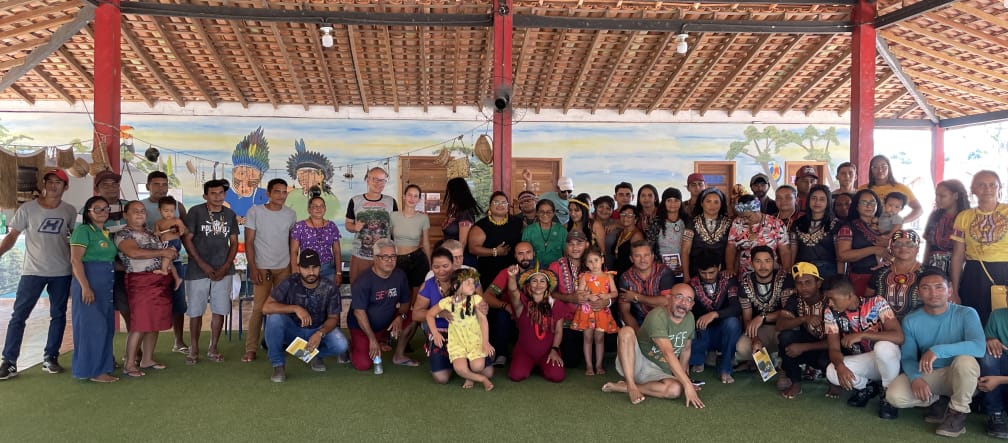Palm oil in Brazil: Return stolen community land, end the violence!
Oil palm plantations are spreading like wildfire across the eastern Brazilian Amazon. But local communities are standing up to the palm oil industry’s brutality and sweeping land grabs, demanding the return of their ancestral lands and calling on the authorities to protect them from encroachment and violence.
To: Brazilian President Lula da Silva; the Ministry of Indigenous Peoples; the National Foundation for Indigenous Peoples (FUNAI); the National Institute for Colonization and Land Reform; the National Council for Human Right
“The Brazilian government must fulfill its constitutional obligations, recognize Indigenous peoples’ land rights, and ensure security and the rule of law.”The Vale do Acará region of the state of Pará is the center of Brazil’s expanding palm oil industry. Rainforest Rescue visited the region in the east of the Amazon, spoke to the people there and agreed to help.
Oil palm plantations are closing in on the ancestral lands of the Indigenous Tembé and Turiwara and the Quilombola, descendants of enslaved people from Africa. Communities complain of land grabbing, forced evictions and the constant threat of massive violence.
The largest plantation owners are Agropalma and Brazil Biofuels (BBF). They alone control 2,400 square kilometers of land – an area one and a half times the size of London.
Many of the parcels in the rainforest are ancestral lands stolen from local Indigenous and Quilombola communities. While courts have annulled the land titles for hundreds of square kilometers of land illegally claimed by Agropalma, the land has not yet been returned.
Local communities continue to be harassed, persecuted, and massively restricted in their freedom of movement and way of life. Violence, humiliation, racism, death threats and criminalization are commonplace. The communities deplore a situation in which people have been seriously injured and killed.
Private security guards, local police and criminal gangs are said to be responsible for the suffering of the local people. The companies involved deny all allegations and continue to claim the area.
The Tembé and Quilombola peoples have drawn attention to the structural violence they face and are demanding the return of their ancestral lands. They ask for international support, continued attention and solidarity.
Please sign our petition and tell the Brazilian state to fulfill its constitutional obligations, recognize land rights and ensure the rule of law and the security of the people.
The conflicts and violence in Vale do Acará prompted Rainforest Rescue, together with representatives of the NGOs CIMI, FASE and the World Rainforest Movement (WRM), to visit the area in August 2023 to meet with members of the affected communities and to build solidarity in support of them. “We have only one choice: leave or resist,” was one of their first things we heard when we arrived.
Further information:
- WRM, Feb. 26, 2024. The struggle for land in the Brazilian Amazon region against palm oil and mining corporations: https://www.wrm.org.uy/bulletin-articles/the-struggle-for-land-in-the-brazilian-amazon-region-against-palm-oil-and-mining-corporations
- Global Witness 2022. Brazil’s biggest palm oil producers Agropalma and Brasil Biofuels accused of serious human rights violations against communities in the Pará region: https://www.globalwitness.org/en/press-releases/brazils-biggest-palm-oil-producers-agropalma-and-brasil-biofuels-human-rights-violations-para-region/
- Global Witness 2022: Major international brands sourcing from Brazilian palm plantations linked to violence, torture and land fraud in the Amazon: https://www.globalwitness.org/en/campaigns/environmental-activists/amazon-palm/
- Global Witness, 9-2022. AMAZON PALM: Major international brands sourcing palm oil from Brazilian plantations linked to violence, torture and land fraud: https://www.globalwitness.org/documents/20418/Amazon_palm_-_September_2022.pdf
In Spanish from our partner organization Avispa Midia:
- Avispa Midia, Nov. 21, 2023. Seguridad de empresa de palma africana asesina a indígena en la Amazonía:https://avispa.org/seguridad-de-empresa-de-palma-africana-asesina-a-indigena-en-la-amazonia/
- Avispa Midia, Oct. 5, 2023. Agropalma es investigada en Brasil por querer lucrar con bosques en la Amazonía:https://avispa.org/agropalma-es-investigada-en-brasil-por-querer-lucrar-con-bosques-en-la-amazonia/
- Avispa Midia, May 22, 2023. PALMA ACEITERA Y CONSERVACIÓN: ALIADAS EN LA EXPULSIÓN DE COMUNIDADES EN LA AMAZONÍA BRASILEÑA: https://avispa.org/palma-aceitera-y-conservación-aliadas-en-la-expulsión-de-comunidades-en-la-amazonía-brasileña/
In Portuguese:
- WRM, Feb. 26, 2024. A luta pela terra na Amazônia brasileira contra empresas de dendê e mineradoras: https://www.wrm.org.uy/pt/artigos-do-boletim/a-luta-pela-terra-na-amazonia-brasileira-contra-empresas-de-dende-e-mineradoras
- Publica, Aug. 18, 2022. Com inércia do governo, empresas do dendê avançam sobre terras públicas da Amazônia: https://apublica.org/2022/08/com-inercia-do-governo-empresas-do-dende-avancam-sobre-terras-publicas-da-amazonia/
- Nestlé compra óleo de palma de empresas envolvidas em violações de direitos humanos na Amazônia paraense: https://www.cartacapital.com.br/blogs/o-joio-e-o-trigo/nestle-compra-oleo-de-palma-de-empresas-envolvidas-em-violacoes-de-direitos-humanos-na-amazonia-paraense/
To: Brazilian President Lula da Silva; the Ministry of Indigenous Peoples; the National Foundation for Indigenous Peoples (FUNAI); the National Institute for Colonization and Land Reform; the National Council for Human Right
Dear Mr. President,
The National Human Rights Council (Recommendation No. 16 of August 8, 2023) 1.) and the United Nations Special Rapporteur (on the situation of human rights defenders in Brazil, April 2024) 2.) agree that the Brazilian government must act urgently to address the current escalation of conflicts, violence and harm against Indigenous and traditional communities.
The structural violence against Indigenous and Quilombola communities is caused by the lack of recognition and demarcation of their ancestral territories, for which the state of Brazil bears full responsibility.
In the northeast of the state of Pará, large tracts of land are claimed by palm oil companies. They rely on the full support of the Brazilian state, yet the state shows complete disregard for the grave social and environmental consequences of the land appropriation by the palm oil industry and the deforestation, degradation and pollution caused by oil palm plantations.
While just two companies, Brazil Biofuels (BBF) and Agropalma, claim over 240,000 hectares of land, the area of officially demarcated Indigenous land in the region is only 147 hectares.
The Turi-Mariquita Indigenous territory of the Tembé people is the smallest officially demarcated Indigenous territory in Brazil.
In addition to environmental degradation, complex socio-environmental conflicts are emerging, with serious negative consequences for local people. The Tembé-Turiware and Quilambola communities have submitted reports and appeals to the relevant authorities, but to no avail.
These communities need not only the immediate recognition and demarcation of the territories that rightfully belong to them, but also protection by the Brazilian state against violence and violation of their basic human rights.
“Agropalma and BBF don’t export palm oil, they export our blood” is the general feeling of the region’s inhabitants.
We call on you to ensure that the armed security forces of the palm oil companies withdraw, and that Agropalma and BBF staff and clients respect the law and stop endangering the security and rights of local communities.
Yours faithfully,
1.) CONSELHO NACIONAL DOS DIREITOS HUMANOS, RECOMENDAÇÃO Nº 16, DE 08 DE AGOSTO DE 2023: https://www.gov.br/participamaisbrasil/blob/baixar/28956
2.) Ministério dos Direitos Humanos e da Cidadania, 19.4.2024. Relatora da ONU exalta empenho do governo federal na proteção de defensores de direitos humanos: https://www.gov.br/mdh/pt-br/assuntos/noticias/2024/abril/relatora-da-onu-exalta-empenho-do-governo-federal-na-protecao-de-defensores-de-direitos-humanos
The issue – rainforest on our dinner tables and in our fuel tanks
At 66 million tons annually, palm oil is the most commonly produced vegetable oil. Its low world market price and properties that lend themselves to processed foods have led the food industry to use it in half of all supermarket products. Palm oil can be found in frozen pizzas, biscuits and margarine, as well as body creams, soaps, makeup, candles and detergents.
Few people realize that almost half of the palm oil imported into the EU is used as biofuel. Since 2009, the mandatory blending of biofuels into motor vehicle fuels has been a major cause of deforestation.
Oil palm plantations currently cover more than 27 million hectares of the Earth’s surface. Forests and human settlements have been destroyed and replaced by “green deserts” containing virtually no biodiversity on an area the size of New Zealand.
The impact – suffering and death in producer countries, climate havoc
The warm, humid climate of the tropics offers perfect growth conditions for oil palms. Day after day, huge tracts of rainforest in Southeast Asia, Latin America and Africa are being bulldozed or torched to make room for more plantations, releasing vast amounts of carbon into the atmosphere. As a consequence, Indonesia – the world’s largest producer of palm oil – temporarily surpassed the United States in terms of greenhouse gas emissions in 2015. With their CO2 and methane emissions, palm oil-based biofuels actually have three times the climate impact of traditional fossil fuels.
Palm oil is not only bad for the climate: As their forest habitat is cleared, endangered species such as the orangutan, Borneo elephant and Sumatran tiger are being pushed closer to extinction. Smallholders and indigenous people who have inhabited and protected the forest for generations are often brutally driven from their land. In Indonesia, more than 700 land conflicts are related to the palm oil industry. Human rights violations are everyday occurrences, even on supposedly “sustainable” and “organic” plantations.
As consumers, we are largely unaware of these broader issues, yet our daily palm oil consumption also impacts our health: refined palm oil contains large amounts of harmful fatty acid esters that are known to damage DNA and cause cancer.
The solution – a revolution on our dinner tables and in our fuel tanks
Only 70,000 orangutans still roam the forests of Southeast Asia, yet the EU’s biofuels policy is pushing them to the brink of extinction. Every new plantation on Borneo is destroying a further piece of their habitat. Stepping up the pressure on policymakers is a must if we want to save our tree-dwelling kin. Apart from that, however, there is still a lot we can do in day-to-day life.
Follow these simple tips to recognize, avoid and combat palm oil:
- Enjoy a home-cooked meal: Use your imagination: why not try almond-coconut-pear biscuits? Or pizza with potato and rosemary? A meal cooked from fresh ingredients beats processed foods containing palm oil every time. Oils such as sunflower, olive, rapeseed or flaxseed are ideal for cooking and baking.
- Read labels: As of December 2014, labeling regulations in the EU require food products to clearly indicate that they contain palm oil. However, in the case of non-food items such as cosmetics and cleaning products, a wide range of chemical names may still be used to hide the use of palm oil. A quick check of your favorite search engine will turn up palm oil-free alternatives, however.
- Remember that the customer is king: Ask your retailers for palm oil-free products. Write product manufacturers and ask them why they aren’t using domestic oils. Companies can be quite sensitive to issues that give their products a bad name, so inquiring with sales staff and contacting manufacturers can make a real difference. Public pressure and increased awareness of the problem have already prompted some producers to stop using palm oil.
- Sign petitions and write your elected representatives: Online campaigns put pressure on policymakers responsible for biofuels and palm oil imports. Have you already signed all of Rainforest Rescue’s petitions?
- Speak out: Protest marches and creative action on the street raise public and media awareness of the issue, which in turn steps up the pressure on policymakers.
- Leave your car at home: Whenever you can, walk, ride a bicycle or use public transport.
- Be informed and inform others: Big Business and governments would like us to believe that biofuels are good for the climate and that oil palm plantations are sustainable. Spread the word – share this information with your family and friends and encourage them to rethink their consumption habits. It’s in our hands!
See our petition related to Agropalma Brazil: “Stop land grabbing and violence for ‘fair and sustainable’ palm oil!” https://www.rainforest-rescue.org/petitions/1262/brazil-stop-land-grabbing-and-violence-for-fair-and-sustainable-palm-oil
Rainforest Rescue, Aug. 11, 2023: “Amazon summit in Brazil: Indigenous people speak out against violence” https://www.rainforest-rescue.org/updates/11680/amazon-summit-in-brazil-Indigenous-people-speak-out-against-violence



